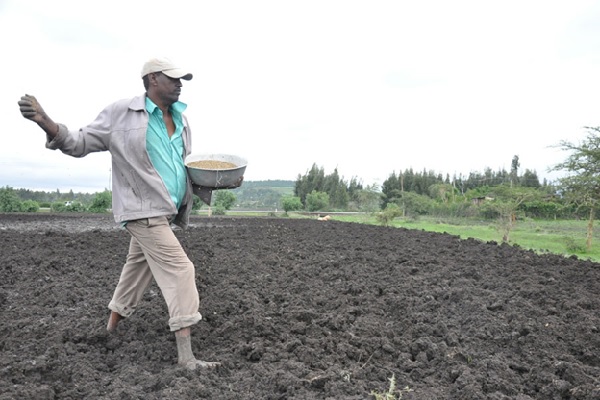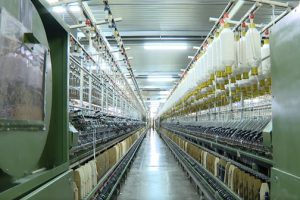
BY MENGESHA AMARE
Agriculture in Ethiopia has long been exercised as the majority of the population in the country has deepened on this traditional and pertinent sector. The country has nowadays embarked on a range of systems to make the sector mechanized and helps farmers produce more using various means. Using fertilizers, whether they are natural, like cow dung or manmade ones, does have many benefits in helping the farming community produce more in terms of quantity and quality.
True, if a country would like its farmers to have better production, it has to employ crop improvement mechanisms like using fertilizer, entirely organic if possible. Fertilizers are of significantly useful in providing crops with specific nutrient due to its nutrient-specific nature, increasing crop yield and providing crops and plants with additional nutrients, bringing about a rapid effect on crops, and they are easy to transport, store and apply.
Alemayehu Asres is a person whom The Ethiopian Herald talked to about the use of fertilizer and its contribution towards economic change and real growth. He is an economist working for a consultancy firm. As to him, it is quite challenging to meet the demands of the expanding population with limited resources and subsistence life leading farming community as agriculture output has declined due to pests, shortage of fertilizers as well as soil fertility.
According to Alemayehu, fertilizers can be essential to plants in the following ways including they make plants more resistant to pests. As a result, they are using fewer insecticides, which result in healthier crops. Using fertilizer thus improves the water holding capacity of plants, and increase root depth, the potassium content present in fertilizer strengthens the straw and stalks of the plants, the phosphorus present in the fertilizers helps in faster development of roots and formation of seeds as well as nitrogen in the fertilizers promotes plant growth, which is seen in the green color of the plants.
He said, “Bio fertilizers are substances that contain living or latent cells, and even micro-organisms. They provide the soil with the necessary nutrients and microbes for the growth of the plants. They help the soil to retain its fertility. They are environment-friendly and also destroy pathogenic components responsible for causing disease in plants.”
Alemayehu further elucidated that fertilizers, artificial or natural, are the components that increase plant productivity and development. They help the soil increase its fertility thereby promoting growth. The use of manures as compost is presumably as old as agriculture itself. With the help of fertilizers, plants become resilient against harmful plant pathogens, pests, and weeds. Elimination of diseases in plants increases the value in the harvest, too.
He said the soil requires the regular maintenance of its fertility. Naturally, soil comprises of very fine rocks, different types of minerals, and organic matter due to the decomposition of the biological species. According to Alemayehu, at the time of plant growth, essential nutrients are required by the plant for its unimpeded growth. Incorporating fertilizers into the soil guarantees that the plant is getting proper nutrition during its development.
He further stated that knowing the exact amounts of nutrients in the mineral fertilizer also makes it easier to plan the farming process. Throughout the years, farmers have utilized chemical fertilizers to increase the production of crops to meet the increasing demand. But over the years, continuous usage of these chemical fertilizers have proven to be harmful to all forms of life by causing pollution of air and water, and depletion of minerals from the soil. Therefore, there is a need to now change to organic farming that involves the utilization of the Bio-fertilizers.
Bio-fertilizers are living organisms that enhance soil quality. It refers to the utilization of microorganisms like different types of bacteria or fungi that will enhance fertility. Bio-fertilizers are also much more beneficial to the environment compared to their synthetic/chemical counterpart. Due to this very reason, utilizing bio-fertilizers is so beneficial and important.
The Ethiopian Herald had also a stay with Solomon Begna, a Chemist and an agro economist working for a private company as a soil expert. He said, “Fertilizers are used for various purposes. The uses of fertilizers are mentioned below: Used to provide additional nutrients to the plants, they are added to improve the yield of the crops, Nitrogen-rich fertilizers are used for the greening of lawns, Organic fertilizers improve the texture and fertility of the soil, Gardeners use fertilizers to address certain needs of the plants such as nutritional needs as well as fertilizers are added to potted plants to replace the lost nutrients.”
Adding he said, “The application of microbial inoculants (Bio-fertilizers) is a promising technology for future sustainable farming system in view of rapidly decreasing phosphorus stocks and the need to more efficiently use of available nitrogen. Various microbial taxa are currently used as bio-fertilizers, based on their capacity to access nutrients from fertilizer and soil stocks, to fix atmospheric nitrogen, to improve water uptake or to act as bio control agents.”
As to him, using organic fertilizers is an incomparable means for crop productivity except their limited access. “Needless to state, organic fertilizers are natural fertilizers obtained from plants and animals. They enrich the soil with carbon compounded needed for crop activities. Organic fertilizers increase the soil’s organic matter content, promote the reproduction and activities of microorganisms as well as alter the physical and chemical properties of the soil.
Remarkable achievements have been achieved in agricultural production in various states in Ethiopia, but many demanding challenges for ensuring food security and environmental sustainability have remained untouched. This calls for a coordinated effort of all to make real difference.
As to Solomon, field experiments have been conducted to determine the effects of fertilization on enhancing crop, and it has been found that a balanced nutrient application using fertilization is a key management strategy for enhancing crop productivity and environmental safety.
He also said that fertilizers provide the most important nutrients that plants and crops need for proper growth and development. When nutrients are not replaced in the adequate quantity and form, soil productivity will decrease with each harvest. Hence, agricultural experts who are duty bound to guide farmers are expected to seriously focus on the proper utilization of fertilizer.
As to him, agriculture farming, previously dominated by production, currently has diverse objectives. The environmental impacts of crops, the reduced costs of production and the balanced use of fertilization are among the main objectives of modern agriculture, indeed!
The very thing that has to be well known is over-fertilization by farmers, driven by the desire for higher yields, does not always contribute to high yield but it has recently become a common practice for farmers in Ethiopia nonetheless. Unfortunately, over-fertilization decreases the efficiency of nutrient use and causes a series of economic and environmental problems. However, balanced mineral fertilizer inputs have played an important role in increasing the production of cereals, cash crops and other staple foods.
He said, “Undoubtedly, managing agricultural nutrients to provide a safe food supply and secure the environment remains one of the immense challenges of the 21st century. Crop nutrient uptake and crop yields are the principal factors that determine optimal fertilization practices. Therefore, it is very important to apply fertilizers in an efficient and scientific way to minimize loss and to improve the nutrient use efficiency.”
As to Solomon, Sustained crop productivity relies on constant renewal when the supply of nutrients becomes a constraint to plant growth and development. Application of fertilizers is necessary for enhancing crop yields and sustaining soil fertility. However, inappropriate or excessive fertilizer application does not guarantee constantly increasing yields, might result in low nutrient use efficiency, and can cause environmental problems in agro-ecosystems. In general, as the proper utilization of fertilizers a viable means to augment crop production and productivity, it has to receive special attention, he underlined.
THE ETHIOPIAN HERALD TUESDAY 14 FEBRUARY 2023




